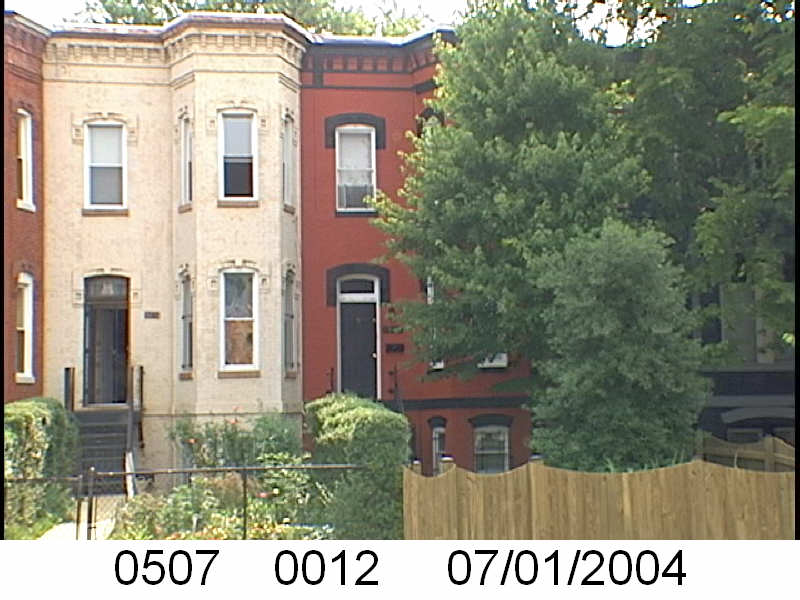
I began with a question. Why did the block change from 100% White in the 1920 census to 100% Black in the 1930 census? I have theories now of why. The main theory I have right now is that the 1920 whites were renters and who ever owned the row of the odd side the 1700 block of New Jersey Ave NW got out of the land lording business and decided to sell to African American buyers. Because it goes from 100% renters in 1920 to majority (not 100%, maybe 80-90%) home owners in 1930.
Let’s look at our renters.
In 1920 there were two households renting 1705 New Jersey Avenue. Knowing what these houses are like, there is an English type basement, so one family could occupy the first two floors and the other the 589 sq. ft. basement.
The first household were the Stewarts headed by 40 year old shipping clerk Bertram Franklin Stewart (1877-1940). He lived at 1705 with his wife Lilian May (nee Clarriage)(d.1949) and their 18 year old son Leslie B. (d.1938) who was an apprentice at the Bureau of Engraving and Printing. In 1910 they were at 1705 New Jersey Av NW.
By 1930 the family moved to a home they purchased in 1925, 3611 17th St NE. Bertram was still a clerk. Leslie was a fireman with the DC FD, married a clerk typist Esther (nee Perry) and the couple lived with the elder Stewarts. Tragedy had struck the family in 1938. Leslie, concerned about his health, committed suicide in his father’s basement. The next month the family lost the home to foreclosure.
Moving on to the next family, Mr. and Mrs. Paul Reed Scott. Paul (1893-1950) was a 23 year old Chauffeur. His wife Stephenie worked as a cashier at a drug store.
In 1910 Paul was a 16 year old living with his widowed mother, Mary G. Scott, a government charwoman, and his three brothers in a house on Minnesota Ave that she owned. In addition to the pension from their late father’s infantry service, Paul and his older brother helped the family by having jobs. Paul was a typewriter for a tabulating machine company. In 1915 Paul married Stephenie A. Randall in Baltimore. By the time of the World War I draft, 1917, he was at 1705 New Jersey Ave NW.
The Scotts purchased 840 Delafield Pl NW in Petworth in 1925. They were there for the 1930 census living with an elderly roomer. They were there for the 1940 and 1950 census. In 1950 Paul died. In 1953 his widow Stephenie sold the house. They had no children.
Now that I’m done with the renters, I can get to the Black home owners, Joseph W. and Juanita M. Sabbs (nee Robinson) (Dabbs in the census). The first document from the DC Recorder of Deeds database (that sorta starts in 1920) is from 1926 and is a loan document with the Perpetual Building Association to borrow $2,600. The next are two other 1926 documents but releases from 2 September 25, 1920 loans with trustees W. Wallace Chiswell and Harry A. Kite. This is more evidence that there was a sell off in 1920 to African American home buyers. Between that and 1950 there are numerous loan documents. In 1953, Juanita, the surviving spouse transferred/sold the house to Runice Hines who immediately sold it to a Thema E. Holland.
Joseph William Sabbs, aka “Old Bill”, started a newspaper selling business at 15th & G St NW when he was 15 years old. As he got older he went from a pushcart to a newsstand. He built up a clientele that included Presidents McKinley and Theodore Roosevelt, bankers, and other businessmen. He was an established businessman, late in his forties, by the time he and Juanita purchased their home on New Jersey Ave NW.
Prior to New Jersey Ave they lived with his mother Olivia Sabbs and their son Fred, in 1910 on 24th St. In 1912, Olivia Sabbs died at 1603 4th St NW. In 1920, the Sabbs weren’t too far, living at 208 R St NW, with son Frederick, daughter Mamie (later Stewart and Greene) and brother Fred.
After 62 years of selling newspapers, with rarely a sick day off, Mr. Sabbs died at Freedmen’s Hospital on January 8, 1949. Being in the newspaper business, he got a nice write up in the Evening Star.
After selling 1705 New Jersey Ave NW in 1953, Mrs. Sabbs bought 101 Rhode Island Ave NE. Less than a year after that she transferred/sold the property to her daughter Mamie Sabbs Greene.
Conclusion, 1953 was the year to sell your house. I put my theories at the top of this post so, that’s what I got.

https://academic.oup.com/chicago-scholarship-online/book/13749/chapter-abstract/167373268?redirectedFrom=fulltext#
1920s market was like the oughts. New product making it easier to buy. Did not go well later.
Reading a book on the flordia market of the 1920s now.
Thanks Charlie. I appreciate the link.